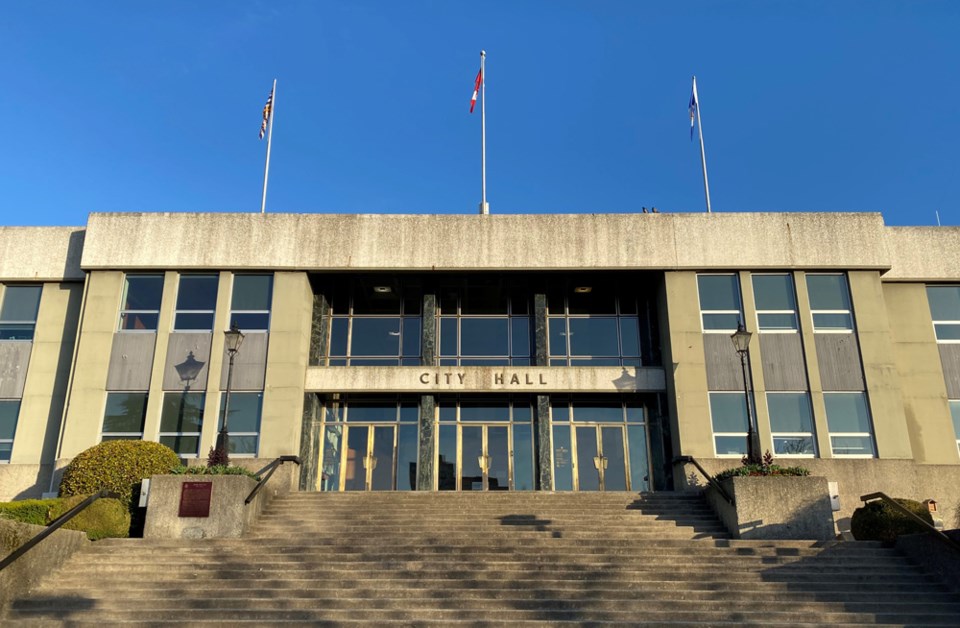A formal review of the New West city council’s remuneration policy will get underway soon – rather than waiting until the 2026 civic election nears.
At its July 8 meeting, council received a staff report about its remuneration. As per the city’s council remuneration policy, which provides annual adjustment based on the Consumer Price Index, members of council will be getting a 4.06 per cent increase to their remuneration for 2024, retroactive to Jan. 1, 2024.
For the mayor that means his 2023 salary of $147,004 rises to $152,973; councillors’ pay rises from $56,540 to $58,836.
In a report to council, staff noted the current council remuneration policy was last reviewed in late 2018. The policy calls for a formal remuneration review to be conducted by an external consultant every four years in the months before an election, with the idea being that any changes would be implemented with the new council.
A staff report states this is consistent with the practice in a number of B.C. municipalities. It’s intended to mitigate any perceived or actual conflict of interest when it comes to council approval of remuneration increases during their term in office.
“The policy was scheduled to be reviewed in 2022 prior to the last election, but the review was not undertaken due to staffing resource challenges in human resources,” said the report. “The next scheduled formal review of the policy will be in 2025 prior to the next municipal election.”
At Monday’s meeting, Mayor Patrick Johnstone posed a question to council for its consideration: instead of reviewing the council remuneration policy closer to the 2026 election, should it be done now?
“Any change in remuneration would only be applied after the election to the incoming council,” he said.
Johnstone noted that former Prime Minister Kim Campbell was famous for saying elections aren’t a good time to have a good conversation about public policy.
“There may be an advantage to us actually having a public policy conversation now, in order to sort of separate that from having that public policy conversation and get attached to the election,” he said. “But I leave that in front of council to decide.”
Coun. Daniel Fontaine said he agreed with Johnstone’s sentiment.
“I think the timing of it – sooner rather than later – is better; get it out into the public domain,” he said. “I'm a big fan of making sure that the public sees these things well in advance.”
Instead of approving the staff recommendation – which would have directed staff to conduct a formal review of the council remuneration policy in 2026 – council unanimously approve Fontaine’s motion directing staff to begin the remuneration review now.
Coun. Nadine Nakagawa said she also supports doing the review as soon as possible.
“I think that it is important that people who are considering running for office know what the remuneration policy is. Not everybody is fortunate enough to be wealthy enough that this doesn't mean taking time off from another job or maybe arranging childcare or life situations,” she said. “So, I think it's really fair that we communicate as quickly as possible, what it is and that we decide for future councils.”
Coun. Ruby Campbell said that doing the review now would give staff time to look at the remuneration provided in other municipalities and provide clarity for people running for council in 2026.
Severance allowance review
Fontaine also put forward a motion for council’s consideration that the review also include an update on the transitional allowance payment to elected officials “to reduce the tax burden on city taxpayers.”
Fontaine and Coun. Paul Minhas, the two New West Progressive members on council, have voiced concerns that some former council members have received separation allowances from the City of New Westminster even though they found full-time employment after leaving council.
“I think that it's time for us to review that to determine whether or not there's a better approach,” Fontaine said Monday.
Fontaine said he “wouldn't say that we need to take away their transition allowance” but he doesn’t think council members should receive the allowance if they are working full time.
Nakagawa proposed an amendment to Fontaine’s motion, which was to delete the words officials “to reduce the tax burden on city taxpayers.” In a 3-2 vote, council supported Nakagawa’s amendment.
Council then unanimously supported the amended motion: that the council remuneration review also include an update on the transitional allowance payment to elected officials.





